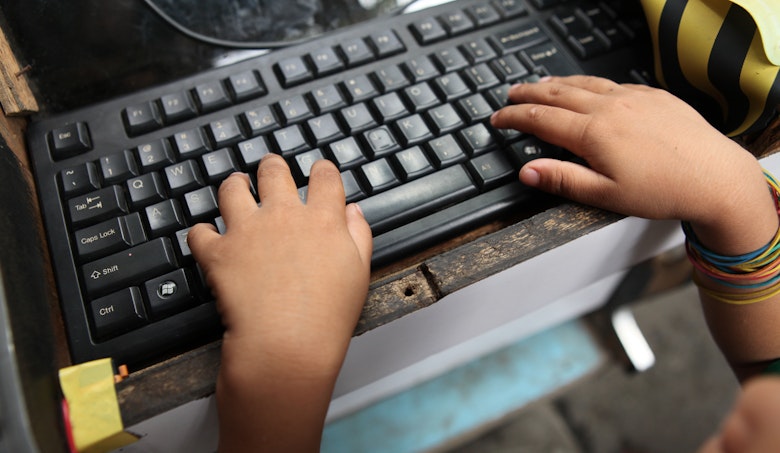Creating a safer Online Environment for Every Child (CONEC) (Philippines)
The internet opens many doors for children. They do their homework, play games and chat with their friends. Children spend a large part of their time online. But wide access to the internet can pose various threats to the safety of children as well. Children are at high risk of being sexually exploited. Together with ECPAT Philippines and the Bidlisiw Foundation, Terre des Hommes Netherlands is working to strengthen child protection systems in order to prevent online sexual exploitation of children.
Background
Online Child Sexual Exploitation (OCSE) is an on-going problem in the Philippines. Although it is difficult to have accurate official data, a recent study carried out by ECPAT, Interpol and Unicef estimates 2 million children have been subjected to “grave” instances of online sexual exploitation and abuse in just one year. In the context of this study, the term “grave” includes, for example, children being blackmailed to engage in sexual activities, or the sharing of sexual images without permission.
OCSE is a complex issue that is influenced by various factors. Poverty, dysfunctional or broken homes, poor parenting, peer influence, (lack of) family values, socio-cultural beliefs and norms all contribute to the vulnerability of children.
In the Philippines, 23.7% of the population lived below the national poverty line in 2021. In addition, the internet is always within reach. The internet and smartphones are cheap in the Philippines and it is easy to transfer money online. This makes it technically easy to exploit children for money.
Traumatised children
Moreover, children and parents/guardians often have limited knowledge and understanding of online sexual exploitation of children. Many of them think that abuse taking place online is less harmful. On the contrary, online sexual abuse can be just as traumatising as offline sexual abuse. It can lead to long-term psychological and developmental problems, negative self-esteem, difficulties in concentrating, or even self-harm or suicide.
Most children remain silent out of shame about what happened to them. They suffer from anxiety and depression. Moreover, online child exploitation materials persist on the internet for a long time and can reach thousands of internet users. By circulating this material, children continue to live in fear that the material will resurface or that people will recognise them from the photos or videos.
Many children hesitate to report on caregivers or other family members that facilitate or commit the offence. Child protection systems in the Philippines are inadequate. Children often do not know where to seek help and relive their traumas due to poor victim support.
Doel CONEC
The goal of this programme is to prevent Online Child Sexual Exploitation. To that end, it is necessary to ensure that
Aanpak Conec
Addressing a complex issue such as OCSE requires a system strengthening approach, so that child protection systems can address risk factors and reduce vulnerabilities while building upon the strengths and resilience of boys and girls, families, communities and governments. Key elements are:
Partners
In this project, we partner with Bidlisiw Foundation and ECPAT Philippines.
Bidlisiw Foundation is a social development non-government agency. Bidlisiw’s development work focuses on helping the poor families, particularly the informal settlers and families with children in need of special protection.
ECPAT Philippines is part of a global network of organisations and individuals working together for the elimination of sexual exploitation of children, child pornography and the trafficking of children for sexual purposes. The ECPAT network spans over 100 countries, working together to counteract all forms of sexual exploitation of children.
Latest news
The Global Research Agenda
On February 1 2024, the Terre des Hommes Netherlands Global Research Agenda was launched, which will guide our…
Youth-Adult Shared Leadership for Change: Erman and Faye's Fight Against Child Exploitation
The journey of Erman and Faye, members of the RPACT (R. Papa Against Child Trafficking), a youth led organisat…
Jed and his dream of a Safer World
I’m Jed. I tend to keep things to myself and try not to draw too much attention. But a harassment experienced…
"I can now protect other children from online sexual abuse"
"My name is Chester and I live in Cebu City, Philippines. I am the vice president of the High Peer Support Gro…
All Filipino children deserve an education: Alexa's wish
Alexa (21) met someone online through Facebook when she was 16. The man enticed her to meet up in person. That…
'I went online and got in touch with people from abroad. At the time I didn't realize I had made the wrong friends.'
Poverty in the Philippines affects many families. It makes millions of children vulnerable, especially those w…
Annual report 2018
Thanks to your support, in 2018 we were able to work on tackling child labor in the mica mines in India, child…

